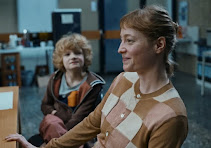It’s not surprising, then, that the range of this genre is so deep, with films like Goodbye Mr. Chips (1939) – nominated for seven Academy Awards, including Best Picture; To Sir With Love (1967) with Sidney Poitier; Dead Poets Society (1989) with Robin Williams; The Hunt (2012) [Denmark] with Mags Mikkelsen; even outliers like Bad Luck Banging Or Loony Porn (2021) – little seen, but winner of the top award [Golden Bear] at the prestigious Berlin International Film Festival. And of course there's 2023’s The Holdovers – recently nominated for 5 Oscars, among them for best picture, best actor [Paul Giamatti], and best supporting actress [Da’Vine Joy Randolph]. The subject of this review is also nominated for an Oscar (for Best International Film). It’s the terrific 2023 German film The Teacher’s Lounge.
While many of the films in this genre reflect a student protagonist’s perspective and some center on that ofa courageous (or struggling) teacher, there also are a few films with a school setting that have broader aims in mind. The Teacher’s Lounge falls into that camp. Award winning director Ilker Çatak has fashioned a film that is at once a character study, mystery, emotional drama and thriller. Set in an unnamed German city, it has a universal feel. It could just as easily be Oakland, or Austin, or Indianapolis. Although it's a rather simple and straightforward story, the movie raises and addresses a tangle of issues. Among them are the play between power dynamics and free will, children’s rights, objective versus relative truth, prejudice, cancel culture, the dangers of certainty, the limits of empathy, and the increasing incapacity of people to actually listen to one another. Sound familiar?
This is not to say that the film is preachy. Far from it. No answers are provided, which is one reason the story is so credible and so resonant. Nor is it the least bit dull. From the first scene to the last, The Teacher’s Lounge is engaging and intriguing. It moves along briskly, and is devised so your expectations keep shifting with every scene.
Here's how it starts [no real spoilers, just the initial setup, to give you an idea]: Carla attends a meeting in the school’s administrative office. Present are Thomas (Michael Klammer), a fellow teacher and Milosz (Rafael Stachoviak), the vice-principal, along with two students, both from Carla’s class (which is presumably why Carla is attending). The kids are there as “student representatives” to discuss a recent raft of thievery at the school. Both kids say that they don’t know anything. But Thomas wants more than that. You don’t need to be certain, he tells them. Maybe you just suspect someone. If you have noticed another kid suddenly wearing expensive duds or flush with cash, that would give us a helpful lead. Under pressure, the boy representative eventually fingers a kid in his class. As the students are leaving, Thomas reminds them “to keep what we’ve discussed to ourselves.” Carla is visibly uncomfortable with all this but says nothing.
In the very next scene, Carla is teaching in her classroom, when Thomas and Milosz, along with the school principal, Dr. Böhm (Anne-Kathrin Gummich) abruptly enter. The girls are told to leave. The boys are required to surrender their wallets for inspection. “It’s voluntary, of course”, says Dr. Böhm to the 12 and 13-year-olds, “but if you’ve got nothing to hide, you’ve got nothing to fear.” The wallet of a boy named Ali contains more cash than usual for a kid his age, and he is removed from the room. In the next scene, now in the principal’s office, Ali’s parents sit with their son and explain that they gave him the cash that morning to buy a gift for his cousin after school that day. They are seething with anger that their son was singled out in front of his peers – certain that this was because they are Turkish. “Our son would never steal”, says his dad, forcibly. Carla stands by, clearly dismayed.Carla spots a colleague pilfering some change from the coffee-contribution piggy bank in the teachers’ lounge. Maybe students should not be the sole suspects, she thinks. Which gives Carla an idea about how to catch the thief in the act on video. Which kind of works - in that she gets her evidence - but far from resolving the problem, this only complicates matters. For one thing, she didn’t go through proper channels before acting, and for another, the suspect she uncovers vehemently denies everything. There is outrage, scurrilous rumors, and counter-accusations - overall a real scandalamity. Much of the ire is directed not at the thief but at well-meaning Carla. This is unsettling and confusing for her, but worse still, the suspect’s son, Oskar (Leo Stettnich) is in Carla’s class - in fact, her favorite student - and he's taking it hard. Oy!
The Teacher’s Lounge succeeds, in part, because its carefully crafted, well written screenplay - by director Çatak and his long-time collaborator Johannes Duncker – so seamlessly incorporates so many elements. The dialogue, the setting, the framing of the issues the movie raises – all are first rate. You may not know where it’s going to go next, but you feel in good hands on the journey. The sense that serious and perhaps ominous things are about to happen is aided by the pitch perfect film score by Marvin Miller.
1 hour 38 minutes Rated PG-13 [Got a teen? Take your teen to see this film]
Grade: A
In select theaters, including Landmark Opera Plaza in S.F and Smith Rafael Film Center in San Rafael, Ca; Laemmle Royal in L.A.; Music Box Theater in Chicago. Rolling out to more each week through mid-February. Click HERE for a venue near you.






No comments:
Post a Comment